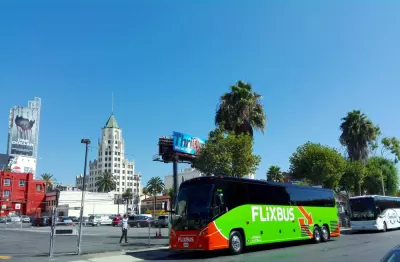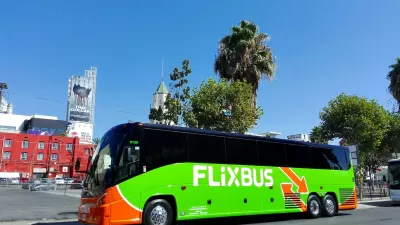Much less expensive than rail, intercity buses serve millions of Americans every year, but public subsidies are lacking.

In an op-ed published inSmart Cities Dive, Kai Boysan, the CEO of Flix North America, an intercity bus operator, argues that funding and supporting intercity bus travel is a cost-effective way to improve transportation in the United States.
With their cost efficiency; flexible, demand-responsive operations; and minimal reliance on ongoing subsidies, privately operated intercity buses offer one of the highest returns on investment for federal transportation funding.
If the Trump administration is looking for efficiency, Boysan argues, intercity buses are the answer to expensive rail projects. “We estimate that intercity bus subsidies deliver more passenger-miles per dollar spent than any other mode of surface transportation — making them one of the highest-return investments for taxpayers while providing an essential service to millions, including some of the nation’s most vulnerable populations.”
Boysan’s obvious vested interest aside, intercity buses do serve some of the lowest-income Americans and offer links between rural and remote places that have few other transit options. According to Boysan, “Intercity buses connect more than 6,000 stations across the U.S., more than 12 times as many locations as long-distance passenger rail and commercial airlines.”
Boysan offers more reasons why investing in intercity bus service is efficient, scalable, and flexible. Targeted federal investments in infrastructure improvements, such as intermodal transportation hubs, could go a long way toward making bus travel more accessible, safe, and comfortable. “In addition, the government should encourage more partnerships between private intercity bus companies and public transportation agencies such as those that facilitate intermodal transportation. These partnerships could lower terminal unit costs per passenger, enhance safety and security through shared personnel and infrastructure and facilitate smoother intermodal transfers, ultimately leading to expanded service and increased ridership.”
FULL STORY: Maximizing ROI in transportation: The case for intercity buses

Trump Administration Could Effectively End Housing Voucher Program
Federal officials are eyeing major cuts to the Section 8 program that helps millions of low-income households pay rent.

Planetizen Federal Action Tracker
A weekly monitor of how Trump’s orders and actions are impacting planners and planning in America.

The 120 Year Old Tiny Home Villages That Sheltered San Francisco’s Earthquake Refugees
More than a century ago, San Francisco mobilized to house thousands of residents displaced by the 1906 earthquake. Could their strategy offer a model for the present?

HSR Reaches Key Settlement in Northern California City
The state’s high-speed rail authority reached an agreement with Millbrae, a key city on the train’s proposed route to San Francisco.

Washington State Legislature Passes Parking Reform Bill
A bill that would limit parking requirements for new developments is headed to the governor’s desk.

Missouri Law Would Ban Protections for Housing Voucher Users
A state law seeks to overturn source-of-income discrimination bans passed by several Missouri cities.
Urban Design for Planners 1: Software Tools
This six-course series explores essential urban design concepts using open source software and equips planners with the tools they need to participate fully in the urban design process.
Planning for Universal Design
Learn the tools for implementing Universal Design in planning regulations.
Ada County Highway District
Clanton & Associates, Inc.
Jessamine County Fiscal Court
Institute for Housing and Urban Development Studies (IHS)
City of Grandview
Harvard GSD Executive Education
Toledo-Lucas County Plan Commissions
Salt Lake City
NYU Wagner Graduate School of Public Service





























